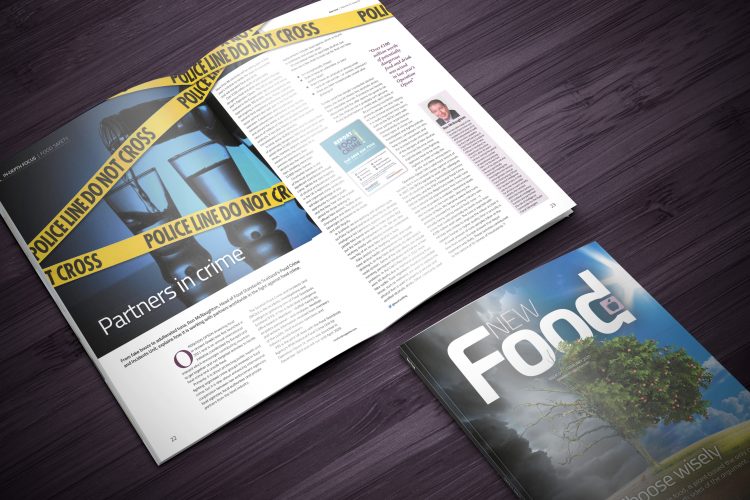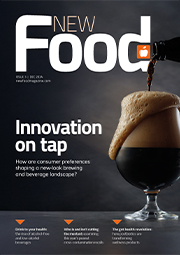New Food Issue 1 2020
- Like
- Digg
- Del
- Tumblr
- VKontakte
- Buffer
- Love This
- Odnoklassniki
- Meneame
- Blogger
- Amazon
- Yahoo Mail
- Gmail
- AOL
- Newsvine
- HackerNews
- Evernote
- MySpace
- Mail.ru
- Viadeo
- Line
- Comments
- Yummly
- SMS
- Viber
- Telegram
- Subscribe
- Skype
- Facebook Messenger
- Kakao
- LiveJournal
- Yammer
- Edgar
- Fintel
- Mix
- Instapaper
- Copy Link
Posted: 13 February 2020 | New Food | No comments yet
Issue 1 2020 of New Food is available to read online, featuring stories on Food Safety, Bakery, Ingredients and much more…


A record number of individuals took part in Veganuary this year, with sustainability being one of the main incentives. It’s not surprising that industry is seeing a move to plant-based, given the number of articles suggesting that it decreases greenhouse gas emissions, reduces water consumption and the amount of waste and byproducts ending up in our oceans.
A simple Google search for meat vs plant-based reveals a narrative that depicts meat as the villain. However, it appears that many of these reports are failing to point out that plant-based ingredients also come with their own challenges.
Hannah Pervez, Consumer Analyst at GlobalData, said: “Since the release of Veganuary in 2014, and through active campaigning, consumers have been led to believe that plant-based lifestyles are more sustainable. However, evidence shows that it takes a vast amount of land and water to facilitate the now high demand for such products, especially soy and almond crops.”
There are also arguments to suggest that shopping locally for meat offsets the carbon emissions produced from exports/imports of plant-based goods. Moreover, plantbased diets have come under scrutiny for whether they provide humans with all the key nutrients needed to make up a healthy diet.
The challenges might seem innocuous right now, but as demand increases, those challenges will intensify, perhaps becoming as or more difficult to overcome than the ones we currently face.
So what is the answer? According to some, it isn’t a case of cutting out meat entirely, but rather adopting a flexible approach; ie, the flexitarian diet. A report from the Committee on Climate Change states that transitioning from a high- to low-meat diet could bring a person’s dietary emissions down by 35 percent.1 This might also be more realistically achievable. Data and financial experts, Finder, said that of the 5.2 million individuals that hoped to completely cut out meat by the end of 2019, only five percent have managed to do so.
Last month also saw a new initiative coming to the fore in direct competition with Veganuary: Organuary. The idea behind this is to include more organ meat into your diet, to reduce the amount of food waste we’re producing.
It is evident that a lot of industry players, organisations and consumers are doing their best to help promote sustainable consumption. It’s just confusing to know which approach to follow. Personally, I don’t believe there is a single method or definitive answer – not right now anyway. But what I do believe is that (in some parts of the world) we are eating and wasting too much. Whether it’s plants or meat you’re eating, perhaps part of the answer lies in moderation.
Included in this edition:
- FOOD SAFETY
Supply chain management is tricky, so what could happen when the worst case scenario occurs? - BAKERY
New Food gets a case of the ‘bread bugs’ as it hears how and why one UK bakery is putting insects into its loaves. - INGREDIENTS
Meat alternatives have changed the protein market as we know it. Here we find out why and how… - DAIRY
The demand for dairy rises, but at the same time the pressure to be sustainable intensifies. I’ts time for dairy farmers to get creative. - CANNABIS
The assessment of CBD oils is complicated, particularly due to the potential for oils to contain undeclared traces of ∆9-THC. Six experts present their research.
References
- https://www.theccc.org.uk/wp-content/uploads/2019/05/Net-Zero-The-UKs-contribution-to-stopping-global-warming.pdf
The rest of this content is restricted - login or subscribe free to access


Why subscribe? Join our growing community of thousands of industry professionals and gain access to:
- bi-monthly issues in print and/or digital format
- case studies, whitepapers, webinars and industry-leading content
- breaking news and features
- our extensive online archive of thousands of articles and years of past issues
- ...And it's all free!
Click here to Subscribe today Login here
Issue
Related topics
CBD hemp & cannabis, Environment, Food Safety, Food Waste, Free From, Ingredients, Plant based, Supply chain, Sustainability, Technology & Innovation, The consumer









